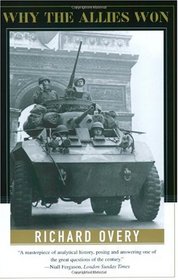Helpful Score: 1
This book deals with logistics and how important it was for the Allies to get their supplies where needed and to cut off the enemy supply routes. It is a fascinating account of the planning by accountant types and is not an oft seen part of the WWII histriography.
Helpful Score: 1
"Just the facts ma'am, just the facts." could be Mr. Overy's motto. Many in general public assume the Allies winning WWII was all but a given. In reality the Allied were utterly unprepared for war in the late 1930's. Where the Axis had been planning and building for years. This highly detailed account describes the advantages and disadvantages of the Axis and Allies, both in men and material, at the start and then throughout the war. He has an unorthodox view regarding the true effects of the massive aerial bombings that cost so many lives on both sides. I highly recommend this book.
Helpful Score: 1
Why the Allies Won views WW2 as a war that could have been lost by the âAlliesâ. By doing this the authors have given a more realistic view of WW2 versus what many Americans are taught and what many 21 century history buffs believe to be a predictable outcome. A fair warning though you will not find detailed war plans in this book you will however find all the information you need to see history from a broader perspective. There are many details about the politics and industry that go into fighting and wining a multi-front and multi-national war that was as complex as WW2 truly was.




